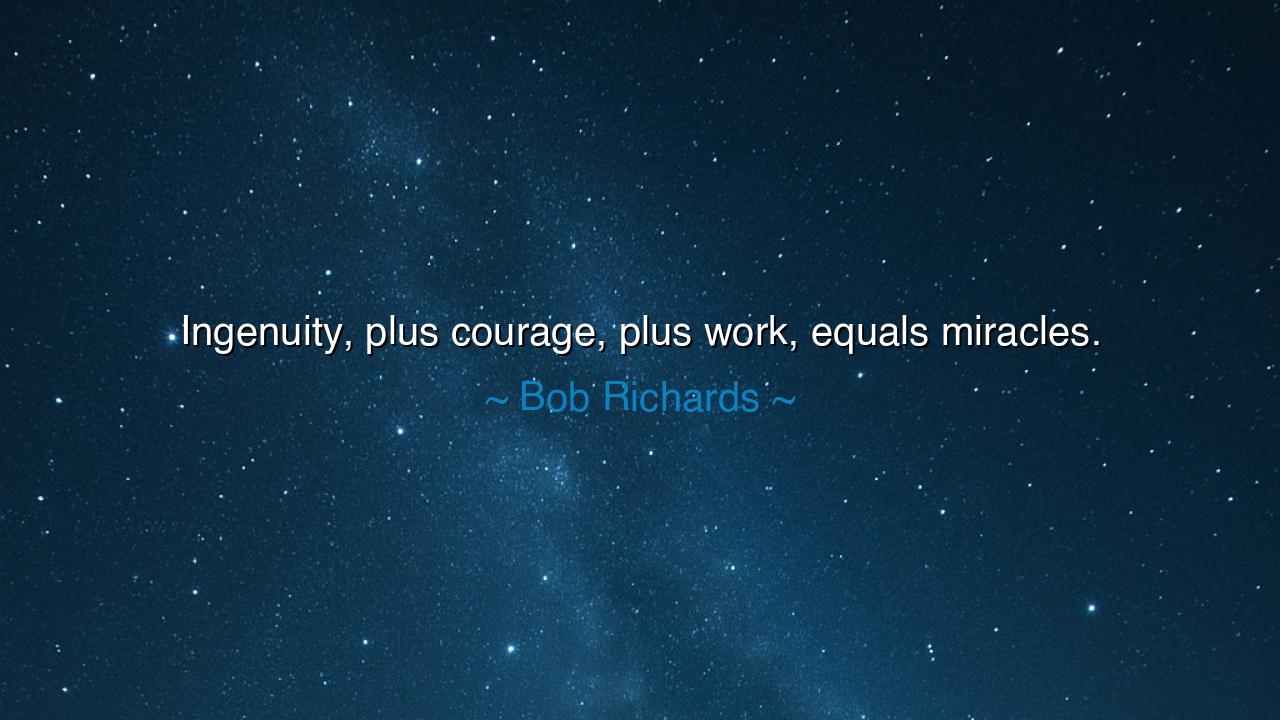
Ingenuity, plus courage, plus work, equals miracles.






The words of Bob Richards — “Ingenuity, plus courage, plus work, equals miracles.” — resound like a timeless formula for the transformation of destiny. In this short and powerful declaration, Richards captures the sacred trinity of human achievement: the mind that imagines, the heart that dares, and the hand that labors. He reminds us that miracles are not accidents of chance, but the harvest of human spirit — born when thought, bravery, and effort unite in harmony. His words echo the wisdom of the ancients: that greatness is never gifted, only forged through will and perseverance.
Richards himself, known as the “Vaulting Vicar,” was an Olympic champion and a man of both faith and action. He knew that faith without effort is hollow, and that work without vision is aimless. When he spoke of ingenuity, courage, and work, he spoke from the soul of one who had conquered limitation — a man who turned adversity into opportunity through the divine powers of creativity and persistence. His message is not merely athletic but universal: that the same force which lifts a man over the bar in competition can lift humanity beyond despair, beyond failure, beyond impossibility.
The first pillar of his teaching, ingenuity, is the spark of the mind — the ability to see not only what is, but what can be. It is the gift of vision, invention, and adaptability. It is what built the bridges of Rome, lit the lamps of the Renaissance, and sent mankind to the stars. Ingenuity allows us to bend circumstances to our will, to find paths where none seem to exist. Yet, as Richards knew, thought alone cannot birth miracles. For ideas without action are like seeds never sown, and vision without bravery fades like smoke upon the wind.
Thus enters the second pillar: courage — the fire that drives the dream forward through the storms of doubt. Courage is not the absence of fear, but the strength to move despite it. It is what made explorers sail into uncharted seas, what made reformers speak truth in the face of tyranny, what made artists and inventors continue their work while the world mocked them. Without courage, ingenuity becomes timid, content to imagine rather than create. Courage gives life to thought, and motion to the impossible.
Yet even these two — the mind that conceives and the heart that dares — are not enough without the final and most enduring pillar: work. For every miracle of man has been born not in moments of glory, but in the long, quiet hours of labor. Work is the sacred ritual through which dreams become flesh. It is the discipline that shapes inspiration into reality, the steady hand that carves meaning from chaos. The pyramids, the cathedrals, the victories of science and the triumphs of art — all are monuments not only to genius or bravery, but to the relentless endurance of work.
Consider the story of Thomas Edison, whose journey embodies this very formula. His ingenuity saw light in the dark; his courage kept him striving through a thousand failures; his work — tireless, methodical, unyielding — finally brought forth the electric lamp. To the world, it was a miracle. But to him, it was the natural result of vision, faith, and labor. So it is with all true miracles — they are born not of divine chance, but of human effort blessed by perseverance.
The lesson of Richards’ words is both humbling and empowering: do not wait for miracles — create them. Every person is endowed with the same sacred ingredients — a mind to imagine, a heart to act, and hands to build. Combine these, and there is nothing beyond reach. Ingenuity gives you direction, courage gives you movement, and work gives you endurance. Together, they form the alchemy of transformation — turning hardship into victory, vision into achievement, and life itself into something luminous.
So, my friend, take this teaching to heart. Do not despair when the world seems vast and unyielding. Begin where you are — think bravely, act boldly, and labor faithfully. For within you burns the same power that built civilizations and wrote history. And when your mind, heart, and hands work as one, you too shall know what Richards meant — that through ingenuity, courage, and work, ordinary men and women summon forth the extraordinary. That is how miracles are made.






AAdministratorAdministrator
Welcome, honored guests. Please leave a comment, we will respond soon